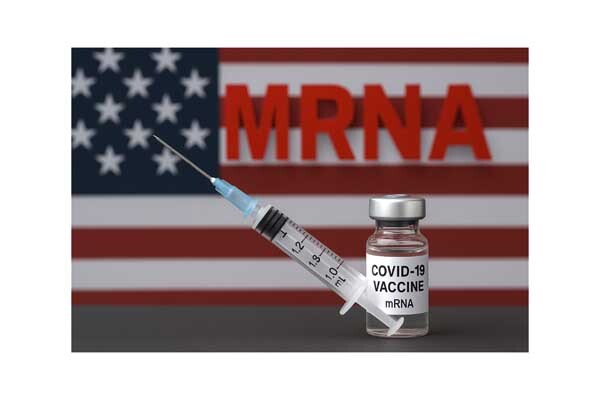
Posted by - News Staff![]() \
\
November 11, 2025 \
Filed in - Health \
vaccine mRNA vaccines Clay Alspach Dr. Bhattacharya \
406 views \ 0 reviews
A Medical Breakthrough Saved Millions of Lives During COVID. Why Are We Turning Our Backs on It Now?
By Clay Alspach
The U.S. government is turning its back on a medical breakthrough that has saved millions of lives, halting $500 million in federal funding to develop new mRNA vaccines against potentially deadly respiratory viruses like COVID-19 and the flu.
This deeply misguided decision by leaders at the Department of Health and Human Services is all the more confounding because it undercuts one of the most dramatic successes of President Donald Trump's first administration: "Operation Warp Speed," which brought to market in record time the mRNA vaccines that helped protect hundreds of millions of Americans and people around the world during the global COVID-19 pandemic and allowed workplaces, schools and the economy to reopen faster.
Dr. Jay Bhattacharya, the director of the National Institutes of Health, called the government's decision to stop funding mRNA vaccines a "necessary pivot" away from technology that is mistrusted by millions of Americans.
It's true that some Americans are skeptical of mRNA vaccines, largely because government officials and many employers imposed vaccine mandates during the COVID-19 pandemic without properly communicating the importance of vaccines and addressing public concerns.
The failure to swiftly listen to those concerns and educate members of the public who were anxious about possible side-effects from new vaccines was a misstep, but it was also understandable considering that there was a deadly global health emergency raging.
What's inexcusable is the decision now, in the wake of the pandemic, to allow vaccine skeptics in the second Trump administration to abandon research that Dr. Bhattacharya himself admits could deliver breakthroughs in our battles against diseases from cancer and influenza to malaria.
The technology behind mRNA harnesses the body's own cells to produce protective and therapeutic proteins, enabling the rapid development of vaccines against respiratory illnesses as well as treatments for rare genetic disorders. It has the potential to be the most promising medical technology of the 21st century. Instead of abandoning it, HHS and the NIH should tackle mistrust of mRNA vaccines and therapies head-on, rebuilding public confidence through an education campaign rooted in transparency and humility.
Earlier this summer, University of Florida researchers inched closer to using mRNA to develop a universal immunotherapy treatment against cancer. In May, scientists at the Children's Hospital of Philadelphia and the University of Pennsylvania used a personalized mRNA-CRISPR therapy to cure a fatal pediatric genetic disease. Other studies have found that mRNA immunotherapies can reduce cancer mortality rates and that mRNA vaccines trigger immune responses in HIV patients to fight the virus.
Research also suggests mRNA could revolutionize how we prepare for future pandemics, enabling us to design and produce effective vaccines in weeks rather than years. This will determine whether America is ready for the next global health emergency.
Walking away from this technology not only endangers America's health, but it also harms our nation's standing as the global leader in biomedical innovation. The United States built the foundation for mRNA technology through decades of federally-funded research. Abandoning it now -- as other nations are accelerating their own programs -- means ceding the next wave of cures to competitors in China or Europe.
The choice for the Trump administration is stark. It can seize this moment to strengthen confidence, correct misunderstandings and double down on a technology that has already changed the course of medicine. Or it can turn back the clock and lose out on the next generation of medical breakthroughs.
Clay Alspach is the executive director of the Alliance for mRNA Medicines, which advocates for mRNA therapeutics and vaccines for the benefit of patients, public health and society. The article originally appeared in the U.S. News & World Report.
Editor’s Note:
The factual claims in this column have been independently reviewed for accuracy. Federal health agencies confirmed the cancellation of approximately $500 million in mRNA vaccine contracts in August 2025, but the Department of Health and Human Services and the National Institutes of Health have emphasized that funding continues for mRNA research in cancer, genetic diseases, and other therapeutic fields. The NIH’s decision was described by Director Dr. Jay Bhattacharya as a “pivot” from respiratory-virus vaccines rather than a full withdrawal from the technology. Likewise, the cited University of Florida and Children’s Hospital of Philadelphia breakthroughs represent early-stage clinical progress rather than approved cures. Overall, the piece reflects the author’s perspective; the underlying events and data points are broadly accurate within that context.

At Desert Local News, connections are everything. We're not just another social networking platform—we're a lively hub where people from all walks of life come together to share stories, spark ideas, and grow together. Here, creativity flourishes, communities grow stronger, and conversations spark global awareness.
Comments